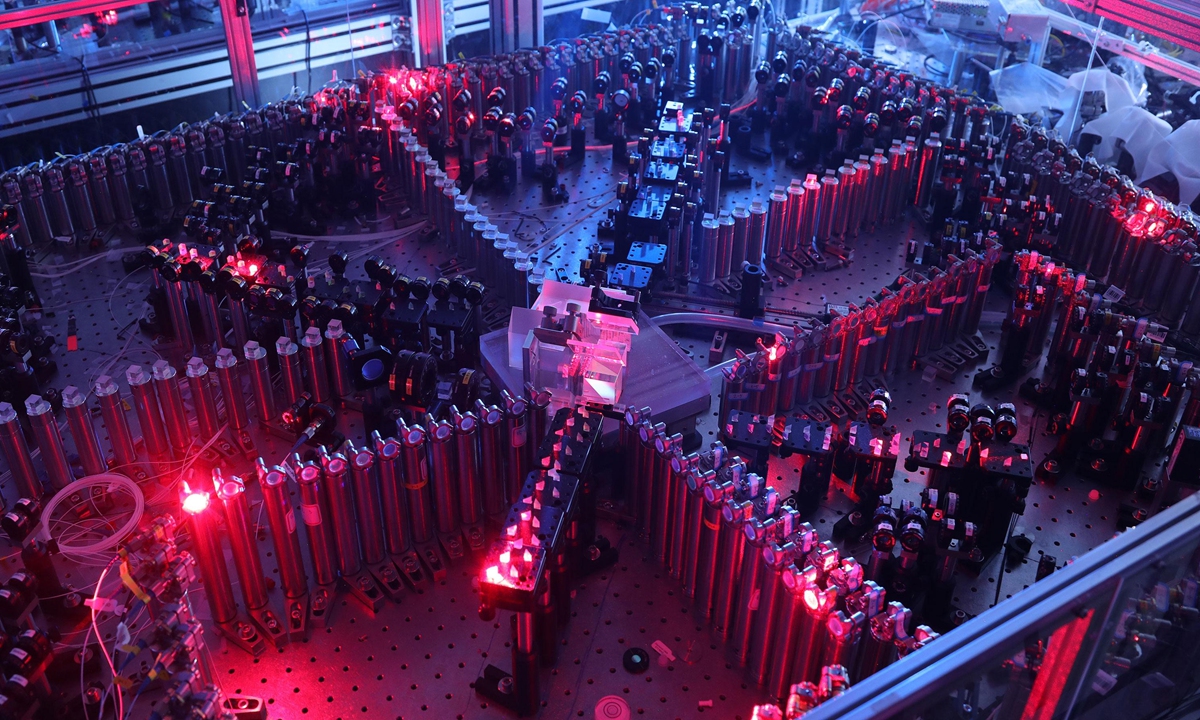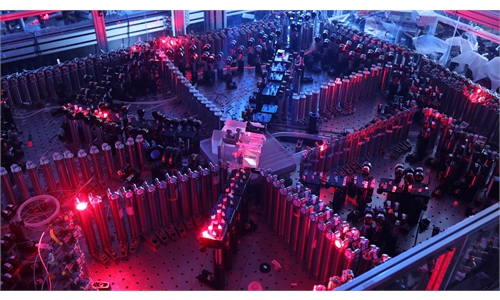Chinese firms to set up quantum chip R&D lab to catch up with global leaders
Move aims to catch up with global leaders, faces long way ahead: insiders

A photo of the Jiuzhang light-based quantum computer prototype Photo: courtesy of University of Science and Technology of China
Two Chinese semiconductor companies have agreed to jointly set up a laboratory for quantum chips to develop low-temperature integrated circuit technology, aiming to build a complete production chain for the crucial high-tech component of the future that is currently dominated by foreign industry leaders, a source at one of the companies confirmed to the Global Times on Sunday.
Industry insiders said that mass production of such chips can't be realized within a short time or make China self-sufficient in the traditional semiconductor field, but it is critical to start research and development (R&D) to avoid overreliance on foreign supplies again in the future.
Origin Quantum Computing Co and Nexchip Semiconductor Corp will be the co-developers of the quantum chip facility based in Hefei, East China's Anhui Province, according to a scientist at Origin.
Quantum chips around the world are still only at the R&D stage, and China is also in the initial stages. Mass production is still far off, the scientist told the Global Times on Sunday on the condition of anonymity.
"The purpose of the laboratory is to catch up to foreign enterprises. From the lab to the market, the industry estimates it could take eight to 10 years, perhaps more," Zhang Xiaorong, director of the Cutting-Edge Technology Research Institute, told the Global Times on Sunday.
Intel has been researching quantum chips for more than a decade but remains in the research stage. China lags behind in terms of technology and related industries. It will take China even more time to realize mass production, said the scientist.
The scientist revealed that the laboratory will use 55-nanometer technology to develop quantum chips in China, which lags behind global leading technologies in the area.
For instance, in 2019, Intel introduced a cryogenic control chip, which was fabricated using Intel's 22-nm technology, to speed up the development of full-stack quantum computing systems, according to Intel.
"China has to start R&D on quantum chips and quantum computing. Otherwise, it may face the pain of a lack of core technology in chips again, as it does today. Therefore, even if the period for R&D is very long, maybe with no economic benefit in the short term, China can't fall behind," the scientist noted.
Quantum chips mainly refer to the processors of quantum computers, namely quantum CPUs, rather than the chips traditionally used in various fields. The development of quantum chips uses traditional chip manufacturing processes.
But analysts said that quantum chips should be the future direction for all kinds of chips.
"Today's chipmaking process has reached its limits at the 1-nanometer level, which means that computing power is nearing its limit. Quantum computing is the hope of breaking this traditional computing limit," the scientist noted.
"The theory of quantum computing is mature, but the technology for making chips is far from maturity, and the manufacturing process is very difficult," Zhang added.
For example, the temperature needs to be close to absolute zero for a quantum chip, so the cooling device needs be huge, compared with a small fan as the cooling equipment for chips in today's personal computers or laptops. Many low-end chips, which don't even need a fan, can be cooled using normal ventilation.
However, as firms are rushing to field of quantum chips, analysts urged caution after recent failed projects in the chip industry such as the fallout of Wuhan Hongxin Semiconductor Manufacturing Co.
"Don't rush to an industry with a bright future blindly," Wang Peng, an associate professor at the Gaoling School of Artificial Intelligence at Renmin University of China, told the Global Times on Sunday.



